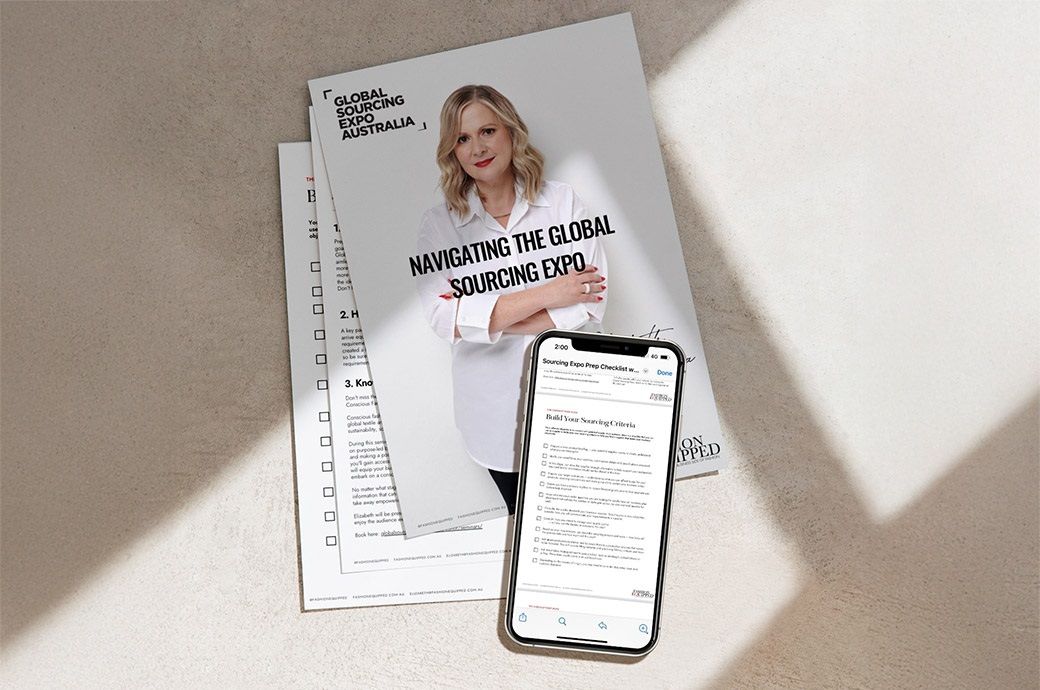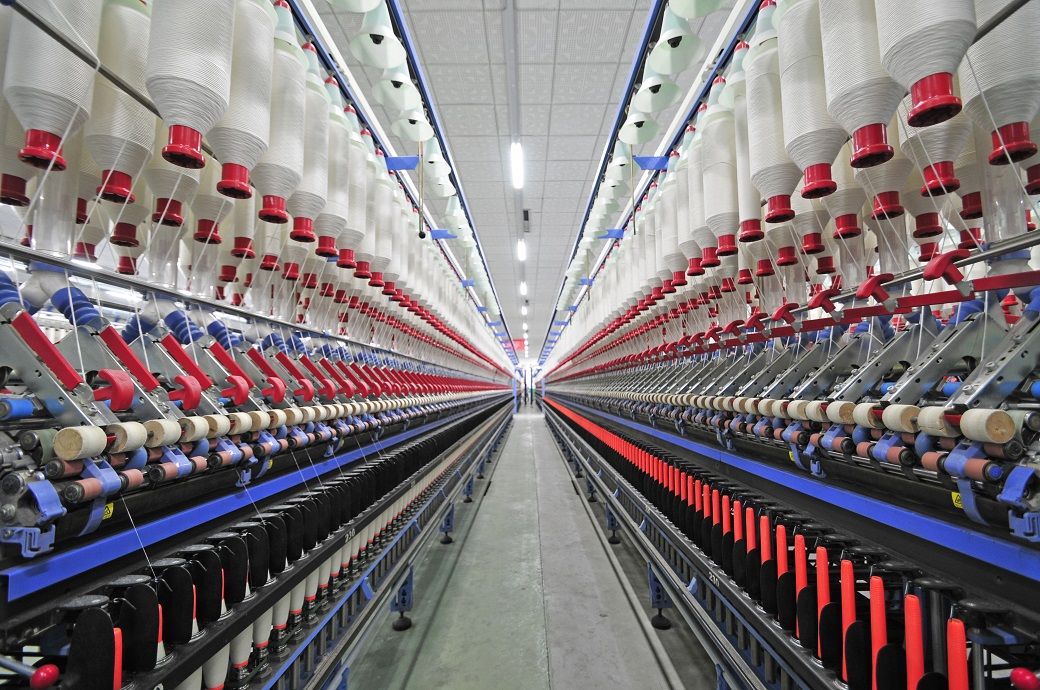Fashion
AI to take centre stage at Global Sourcing Expo 2025 seminar

As part of the Expo’s Global Sourcing Seminar Program, the session ‘Growth, e-commerce and AI in Fashion’ on Tuesday, November 18 at 3 pm will bring together leading voices from across the fashion and lifestyle sectors to explore how technology and creativity are combining to drive smarter, more sustainable business growth.
AI’s transformative role in fashion will take centre stage at the Global Sourcing Expo’s seminar, ‘Growth, e-commerce and AI in Fashion,’ on November 18.
Led by Elizabeth Formosa with panellists Kelly Slessor and Christina Exie, the session explores how AI drives smarter, more sustainable growth, enhances creativity, and empowers brands—big or small—to innovate responsibly and reduce waste.
Led by Elizabeth Formosa, Founder of Fashion Equipped, the discussion features Kelly Slessor (Founder, The Ecommerce Tribe & Tribe Gen AI) and Christina Exie (Co-Founder, Stacked Studio), who together will share practical strategies and real-world examples that reflect the industry’s rapid digital evolution.
AI in Fashion: From Hype to Real-World Impact
Formosa says the conversation around AI in fashion has moved beyond the buzzwords:
“AI is changing how our entire industry operates, from design and sourcing to marketing and customer experience. Brands are no longer asking if they should use AI, but how to use it effectively and responsibly. It’s not just about technology; it’s about transformation and staying relevant in a rapidly evolving market.”
According to Formosa, AI is now integral to how fashion businesses grow and connect with their audiences.
“AI helps brands understand their customers on a much deeper level. It allows them to personalise experiences, predict demand, and make smarter, faster decisions. From optimising assortments to improving marketing spend, it’s about using data to support creativity, not replace it.”
Empowering Every Brand to Innovate
For smaller or emerging brands, Formosa believes that embracing AI doesn’t need to be overwhelming.
“Start simple and strategic. Identify one area where AI can make a real difference — whether that’s analysing sales data, creating content, or improving your customer experience — and start there. Keep it aligned to your goals and values, learn as you go, and build confidence through small wins.”
She also emphasises the importance of education and community:
“Attending events like the Global Sourcing Expo is a great way to gain practical insights and knowledge from leaders on the front line of our industry.”
Technology as a Tool for Creativity and Sustainability
Formosa describes this as an “incredible time to be in fashion,” with AI helping the industry work smarter and make more responsible choices.
“AI gives brands the clarity to make better decisions and the freedom to innovate with purpose. It’s helping reduce waste through smarter forecasting, improved inventory management, and better product development. By predicting demand more accurately, we can minimise overproduction — one of fashion’s biggest sustainability challenges.”
Actionable Insights for a Fast-Moving Market
The Global Sourcing Seminar Program is designed to complement the Expo’s vibrant show floor, offering attendees expert-led education sessions that turn ideas into action.
Elizabeth Formosa’s session promises to deliver practical, actionable takeaways across sourcing, brand development, digital strategy, and AI adoption.
“This session will empower attendees to take immediate action,” says Formosa. “You’ll leave with the clarity, confidence, and tools to grow and strengthen your business in today’s fast-moving market.”
Attendees are also encouraged to download Fashion Equipped’s free guide, Navigating the Global Sourcing Expo, which includes tips and checklists to help businesses prepare, engage with manufacturers effectively, and maximise results from their Expo experience.
Note: The headline, insights, and image of this press release may have been refined by the Fibre2Fashion staff; the rest of the content remains unchanged.
Fibre2Fashion News Desk (SG)
Fashion
Renewable energy uptake grows, but textile decarbonisation lags

Despite rising renewable installations, global textile decarbonisation remains slow and uneven.
Coal-heavy thermal processes, especially in large tier-2 facilities, continue to dominate emissions, while renewables still form a small share of total energy use.
Progress hinges on accelerating coal exit, electrification, and targeted action in high-impact facilities.
Source link
Fashion
India’s Arvind Fashions posts strong Q3 FY26 as revenue jumps 14.5%

Arvind Fashions Limited has reported strong Q3 FY26 performance, with revenue rising 14.5 per cent YoY to ₹1,377 crore (~$149.6 million), driven by robust direct-to-consumer growth.
EBITDA increased 18 per cent, with margin expansion to 14.2 per cent.
Retail like-to-like grew 8.2 per cent, online B2C nearly 50 per cent, while nine-month revenues reached ₹3,901 crore (~$424 million).
Source link
Fashion
India Budget signals manufacturing depth & cluster-led textile growth

From a global sourcing and export perspective, Sanjay Jain, Group CEO of PDS Ltd, welcomed the integrated vision outlined in the Budget. “As a sector that provides direct employment to over 45 million people and supports nearly 100 million livelihoods indirectly, these measures are both timely and impactful,” he said. Jain highlighted the thrust on public capital expenditure, champion MSMEs, Samarth 2.0 and Tex-Eco, adding that PM MITRA parks and cluster modernisation will help reduce import dependence and strengthen MMF apparel and technical textiles. “This Budget reinforces confidence in India’s journey towards becoming a globally integrated, high-quality manufacturing hub,” he said.
Highlighting supply-chain realignments, Priyavrata Mafatlal, vice-chairman of Arvind Mafatlal Group and MD of Mafatlal Industries, said the Budget improves planning visibility for manufacturers. “The thrust on fibre supply, scale and value addition will help stabilise input costs, improve margins and enable positive investment decisions,” he said. Mafatlal also welcomed the focus on skilling aligned with automation, digitalisation and AI, calling it essential to bridge the industry’s employability gap.
India’s textile and apparel industry views the Budget 2026–27 as a strategic signal focused on manufacturing depth, MSME-led growth and long-term competitiveness rather than headline announcements.
Industry leaders highlighted cluster revival, MSME financing, skilling and sustainability as key positives, while flagging unresolved concerns around power costs and fibre competitiveness.
Gautam Ganeriwal, executive director of Sitaram Spinners Pvt Ltd, said the Budget reflects learning from ground realities. “Every Budget needs to be read not for announcements, but for intent. From a textile industry lens, today’s Budget carries a clear signal: India wants manufacturing depth, not just manufacturing headlines,” he said. Ganeriwal highlighted the Integrated Programme for Textiles, revival of 200 legacy clusters, strengthened MSME finance through TReDS, and professional support via Corporate Mitras as meaningful interventions. However, he noted that cost competitiveness remains unresolved, citing power tariffs, cross-subsidies and fibre cost distortions, while calling for the removal of import duty on cotton and MMF raw materials.
From a policy and advisory lens, Kanishk Maheshwari, co-founder and MD of Primus Partners, said textiles have emerged as a spotlight sector. “The focus on modernised infrastructure and skill upgradation will provide a significant boost to foreign investments and link indigenous textile units to global value chains,” he said.
MSME-focused reforms were another major theme. Rohit Mahajan, founder and managing partner of Plutos ONE, said the ₹10,000 crore MSME Growth Fund marks a decisive shift from subsidies to scale-led competitiveness. “The integration of GeM with TReDS and the move to make receivables tradable as asset-backed securities directly address working capital challenges and lower the cost of capital for MSMEs,” he said, adding that such reforms will support tariff-resilient, export-ready enterprises.
Echoing long-term optimism, Nitin Jain, founder of Ivyn, said the revival of 2,000 clusters, creation of the MSME growth fund and establishment of mega textile parks signal sustained commitment. “These measures will modernise the textile and garment ecosystem, enabling scale, innovation and global competitiveness,” he said.
Industry stakeholders said that while the Budget sets a strong structural direction for textiles, garments and MSMEs, effective implementation, power-sector reforms and fibre cost competitiveness will be critical to translating intent into sustained growth.
New-age D2C fashion brands have welcomed the Budget, saying its export-oriented measures, cluster modernisation and sustainability focus create a stronger foundation for Indian brands looking to scale globally while building value-added manufacturing at home. Siddharth Dungarwal, founder of Snitch, said the Budget takes a decisive step towards positioning India as a global textile and apparel powerhouse. “The focus on export enablement, duty rationalisation for leather and synthetic goods, and the removal of the courier export value cap will significantly benefit brands and manufacturers looking to scale internationally,” he said.
Dungarwal added that the integrated policy approach covering fibres, skilling, cluster modernisation, sustainability and technical textiles reflects a long-term vision for the sector. “For new-age D2C brands and exporters, this Budget creates the right foundation to compete globally while building value-added manufacturing capabilities in India,” he said.
From the perspective of women-led D2C businesses, Tejasvi Madan, founder of Beyond Bound, said the Budget could go further in addressing the specific needs of emerging fashion exporters. She called for a dedicated export-readiness programme for D2C fashion brands, faster GST refunds and duty drawback timelines, and simplified cross-border payment and forex compliance.
Madan also highlighted the need for special credit lines and incubation support for women-founded apparel start-ups, along with plug-and-play shared manufacturing facilities and capital subsidies for flexible, small-batch production. “Incentives for sustainable and circular fashion, R&D support for next-generation fabrics, modern skilling for athleisure and technical apparel, and a ‘Made in India Activewear’ global branding mission would significantly accelerate responsible growth,” she said.
Industry observers said the Budget’s export facilitation measures and manufacturing-led focus provide momentum for India’s fast-growing D2C fashion ecosystem, while targeted policy refinements could further help home-grown brands compete in global markets.
Fibre2Fashion News Desk (KUL)
-

 Sports7 days ago
Sports7 days agoPSL 11: Local players’ category renewals unveiled ahead of auction
-

 Entertainment7 days ago
Entertainment7 days agoClaire Danes reveals how she reacted to pregnancy at 44
-

 Sports7 days ago
Sports7 days agoCollege football’s top 100 games of the 2025 season
-

 Business1 week ago
Business1 week agoBanking services disrupted as bank employees go on nationwide strike demanding five-day work week
-

 Politics7 days ago
Politics7 days agoTrump vows to ‘de-escalate’ after Minneapolis shootings
-

 Tech1 week ago
Tech1 week agoBrighten Your Darkest Time (of Year) With This Smart Home Upgrade
-

 Sports7 days ago
Sports7 days agoTammy Abraham joins Aston Villa 1 day after Besiktas transfer
-

 Business7 days ago
Business7 days agoGM expects to top Ford in U.S. vehicle production as it faces up to $4 billion in tariff costs


















